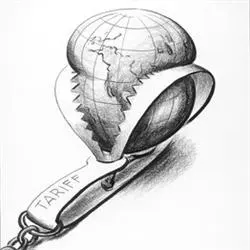The Economics of Tariffs: A Deep Dive into the Upcoming Trade War

COMMENT FROM GEMMA: "We are toast!?"
With the impending tariff war set to kick off between Canada and the USA this coming Tuesday, many in the working class are feeling anxious about the future. The sentiment echoes among individuals like Gemma, who fear that their lives may plummet even further into economic distress.
As we stand on the cusp of this potential trade conflict, the conversation about its ramifications, especially for working-class individuals, is more critical than ever.
Analyzing the Tariff Landscape
The groundwork for the upcoming tariffs has already set off alarms for many. President Trump has hinted that while there may be some initial pain, the long-term results would be overwhelmingly positive if companies choose to “build it here” rather than abroad. Yet, this foundational strategy raises important questions: Will it create broader economic opportunities, or will it lead to a deeper recession for some sectors and a depression for others?
Implications of Tariffs
Amid ongoing discussions and debates regarding the rise of tariffs, there is mounting evidence to suggest that past practices may not deliver the expected results. Our models indicate that the world economy is potentially on the decline, aligning predictions for a downturn extending into 2028. This perspective places the impact of current tariff policies at the forefront of economic discussions.
The concern is not merely theoretical. Our analysis shows historical parallels, reminiscent of decisions made during the Great Depression when tariffs were significantly implicated in the economic downturn of the era.

Historic Precedents and Economic Missteps
Historically, the imposition of tariffs has led to unintended consequences–disrupting trade relationships and causing a ripple effect of unemployment both domestically and abroad. As we consider the modern implications of these tariffs, we must critically evaluate the outdated economic theories driving them.
Economic history has shown us that trade barriers often backfire, creating a series of economic challenges that can encompass inflation, currency manipulation, and increased costs for consumers. Our research suggests that the framework guiding today’s economic tactics often recalls teachings dated back to Karl Marx—focusing on an oversimplified view of labor cost differentials without accounting for the complexities of global supply chains.
The Complexity of Economic Theories
Contemporary economic thought needs to adapt to the nuances of today’s interconnected economy. Unfortunately, there is a prevailing reliance on archaic models which fail to account for the intricacies of modern market dynamics.
For instance, John Maynard Keynes identified a critical truth: In the face of uncertainty, individuals hoard money rather than spend it, leading to a decrease in the velocity of money circulation—essentially stifling economic growth. We’re seeing similar sentiment today. As economic pressures mount, consumer confidence wanes, and spending power is curtailed.

The Path Forward: Creating Dialogue
At Extreme Investor Network, we believe that change comes through informed dialogue, innovative thinking, and a willingness to question entrenched narratives.
As we continue to navigate the potential fallout from these tariffs, it’s vital for economic leaders—including policymakers and advisors in Washington—to open their ears to non-traditional perspectives. We strive to foster discussions that inform the next generation of economic leaders. That’s why we are hosting a World Economic Conference aimed at unraveling these outdated concepts and equipping attendees with the tools and knowledge to understand the real workings of our economy.
The upcoming conference, set to be held in late spring, will not only feature live sessions but will be accessible worldwide through streaming—allowing students and economic enthusiasts across borders to participate and engage in meaningful dialogue.
Conclusion: A Call to Action for Investors
As we stand at this critical juncture in economic history, investors must remain vigilant and informed. The implications of tariffs and protectionist policies extend beyond simple trade disagreements; their effects reverberate through economies, impacting employment, prices, and the very fabric of consumer behavior.
Stay connected with Extreme Investor Network as we dissect these issues in greater depth and work diligently towards solutions that benefit all sectors of society. Don’t just be a spectator in this evolving narrative—join the discussion and help shape the economic landscape of tomorrow.
By choosing to engage with us at Extreme Investor Network, you’re not just getting the facts; you’re becoming part of a community dedicated to understanding the complex world of economics and driving positive change.

